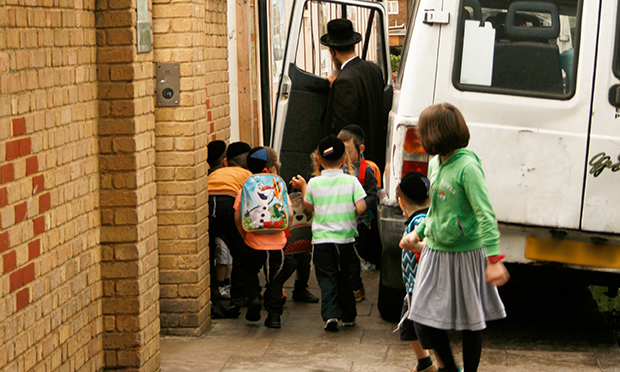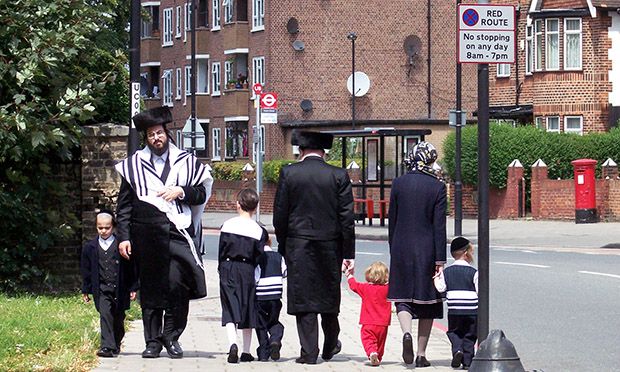Risk of ‘Rotherham’ situation warns Hackney councillor in unregistered Orthodox Jewish schools row

Pupils leave after the school day at Talmud Torah Machzikei Hadass. Photograph: Hackney Citizen
Tensions between child safeguarding chiefs and the strictly orthodox Jewish community in Stamford Hill were openly exposed last night as part of a Town Hall investigation into unregistered schools.
The starkest warning yet that a lack of official oversight of yeshivas – establishments teaching the Torah and Talmud – exacerbated the risk of a “Rotherham situation” developing in Hackney was issued by Councillor Chris Kennedy.
Cllr Kennedy, who chairs the Children and Young People Scrutiny Commission, told rabbis he had been driven to investigate amid mounting frustration after it was revealed large numbers of Jewish boys were missing from the education register.
Every year more than 450 Haredi Jewish boys are in registered schools at the age of four, but this drops to about 50 boys by the age of 13.
Most girls from the community continue in state education until they are 16 years old.
Cllr Kennedy said: “One of the big fears that we as a commission had when we talked about doing this review was the worry that there might be another Rotherham situation, here in Hackney – that if we didn’t take action when we were told there are all these children missing from the school register we would be failing in our duty as a council.”
Councillors heard sexual abuse in unregistered schools would be a “worst case scenario” but that the prospect of people with a sexual interest in children gaining positions of trust so they could exploit them could never be ruled out in any setting.
Cllr Kennedy and a colleague are due to meet with figures from the Department for Education this week to discuss what are believed to be more than 30 unregistered Haredi Jewish schools currently operating illegally in Hackney.
These institutions exist outside of the legal regulatory framework, meaning councillors and council officers cannot be sure all measures to keep children safe are being taken.
Risks
There is mounting annoyance among local politicians throughout London about “under the radar” institutions like madrassas and yeshivas, which were described as part of an “unmapped sector” by experts who gave evidence at a recent London Assembly meeting on this issue.
Rory McCallum, senior professional advisor to City and Hackney Safeguarding Children Board, told last night’s meeting: “Putting it bluntly, with unregistered schools we have no credible oversight of their ability to meet [child protection] standards.”
He cited the probable absence of “robust” vetting and recruitment processes, DBS background checks and the like, as a potential cause for concern.
Criminal Records Bureau (CRB) checks are now called Disclosure and Barring Service (DBS) checks.
“I don’t need to be explaining to members in this room about some of the national scandals there have been,” he said. “One of the most recent was the FA [scandal] with the coaches. People in positions of trust access those positions of trust, and those that have deviant a sexual interest in children long to find themselves in those particular positions.
“That’s in every community. I’m not targeting just unregistered settings. People in positions of trust in a range of different settings pose a risk.”
He said he found the approach of some sections of the Stamford Hill community to the issue of child safeguarding at unregistered schools “vexing”.
“It almost seems there’s an audacious approach to the use of legislation to fix a problem that we’re all potentially concerned about,” he added.
In 2010 the council asked schools, both registered and unregistered, for information on pupil numbers.
But following a legal challenge by parents, they were told to return that information for reasons of data protection.
McCallum said part of the role of regulator Ofsted was to ensure the safety of children in educational settings.
But two rabbis in attendance said they did not trust Ofsted not to move from safeguarding into enforcement of issues to do with curriculum – something they believed would immediately lead to clashes because of non-negotiable cultural and religious “red lines” being crossed.
It is understood this was was a reference to aspects of the government’s “British values” agenda and issues like teaching of sex education, evolution, sexuality and gender equality, which provoke strong feeling in the ultra-orthodox community.
‘Agenda’ claims
Rabbi Judah Baumgarten indicated he and other leaders of the community would be keen to collaborate with the safeguarding board to protect children but said they would not engage with Ofsted, which he accused of “having an agenda”.

Hackney is home to more than 20,000 Haredi Orthodox Jews. Photograph: kafka4prez via Flickr
He said: “The safeguarding of children in our community is paramount. For us, safeguarding of children is as important, and maybe even I venture to say more important, than in other communities.
“Our children are our children. As a community it’s not a question of ‘It’s your child’. We consider, and as leaders of community we can say on behalf of the community, that all these children are our children and deserve to be safeguarded.”
But he added: “It is just when the issues get clouded and suddenly you get a regime over here that has got a completely different agenda [and is] possibly even on a collision course with the community.
“Then obviously the community says, you’re coming to us, you’ve got a different agenda, and it’s not safeguarding per se.”
Referring to the sway respected rabbis have in the notoriously insular Stamford Hill community, he added: “We’ve got possibly even stronger enforcement powers than any other authority, the rabbinical authority and so on. People will listen, will adhere, people understand this.
“The issues are not sort of hidden under the carpet as was suggested. That’s not the case.
“If safeguarding is a standalone requirement, a standalone regulation, whatever you want to call it, I don’t think you’d have a problem. On the contrary, we would very much welcome it.”
Rabbi Avrohom Pinter added: “We would like to do everything to help…to work together, but I think there needs to be this trust.
“Sometimes there are other agendas, and I think if we talk about health and safety and safeguarding, we need to be very clear that this is about safeguarding and it’s not a back way to dealing with other issues.”
Concern was also expressed about planning and health and safety issues around some of the buildings suspected of housing unregistered schools.
Steve Dudeney, the borough commander of Hackney Fire Service, said there had been five fires in a total of 32 such buildings over the “past few years” – a rate he described as “slightly high”.
He added: “One was a moderately serious fire from my point of view, from a professional point of view. That fire had the potential to spread. Had it not been for a previous enforcement visit and some work that had been done to close the staircase then we might have been having a different discussion.”
There are currently seven open planning enforcement cases about the use of properties in Hackney as unregistered schools.
The council believes at some such sites more than one hundred boys are under the supervision of voluntary teaching staff. Some inspected properties where boys over the age of 16 are believed to be being boarded have in the past been found by inspectors to be in a poor state of repair.
Rabbi Pinter said in the local Haredi community was growing in size by a net rate of four per cent per year.
He asked: “What support over the last 50 years has the council offered in providing suitable sites for this community, when they’ve known clearly there’s a four per cent growth and that’s continuing?”
The investigation is part of what appears to be a tougher line taken by the council towards instances of the ultra-orthodox community flouting the rules on planning and education.
Last night’s standoff ended with agreement over the importance of safeguarding as well as tentative indications that the community will now work with officials from parts of the council to try and address concerns and give reassurance that children in the community are safe.
More than 1,000 Jewish boys are currently missing from the education register in Hackney, the council recently confirmed. Orthodox Jewish families do not tend to expect girls to attend religious schools.
